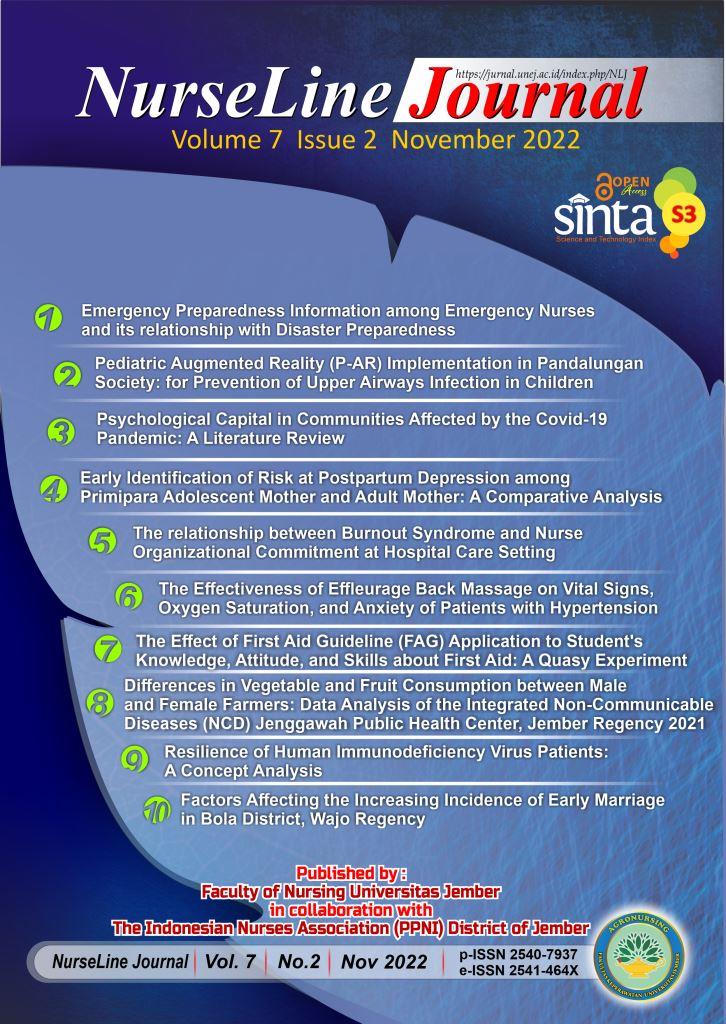Psychological Capital In Communities Affected by The COVID-19 Pandemic
DOI:
https://doi.org/10.19184/nlj.v7i2.27483Keywords:
Psychological Capital, Communitie, COVID-19Abstract
Coronavirus disease (COVID-19) started in Wuhan, one of the largest cities in China. The COVID-19 pandemic has had a tremendous psychological impact on the public due to its high rate of infectivity and mortality—various stressors associated with COVID-19 and associated psychological stress. Interventions to reduce stress and increase environmental support are critical to lowering psychological pressure during infectious diseases such as COVID-19. The strategy to determine the selection of studies that have been found, the author uses a protocol and evaluation uses the PRISMA Checklist and is adjusted to the purpose of this literature review. Searching for literature sources in this literature review uses several databases, including PubMed, ScienceDirect. Psychological capital has a vital role in generating entrepreneurial intentions and building business mentality in students in starting startups during the COVID-19 pandemic. A person is more likely to be psychologically affected during periods of self-isolation due to loss of social connections and more excellent isolation, which usually disrupts active routines and ways of life. There are four dimensions of psychological capital, namely: self-efficacy, hope, optimism, and resilience.
Downloads
References
Guo, S., A. C. Kaminga, dan J. Xiong. 2021. Depression and coping styles of college students in china during covid-19 pandemic: a systemic review and meta-analysis. Frontiers in Public Health. 9(July)
Li, D. 2020. Influence of the youth’s psychological capital on social anxiety during the covid-19 pandemic outbreak: the mediating role of coping style. Iranian Journal of Public Health. 49(11):2060–2068.
Liu, M. dan Z. Xie. 2020. Dampak sistem kerja berkinerja tinggi terhadap niat berpindah karyawan generasi baru: modal psikologis sebagai mediator dan persepsi. Jurnal Industri dan Bisnis Amerika
Malek Rivan, N. F., H. M. Yahya, S. Shahar, D. K. Ajit Singh, N. Ibrahim, A. F. Mat Ludin, N. I. Mohamed Sakian, H. Mahadzir, P. Subramaniam, dan M. Z. A. Kamaruddin. 2021. The impact of poor nutrient intakes and food insecurity on the psychological distress among community-dwelling middle-aged and older adults during the covid-19 pandemic. Nutrients. 13(2):1–12.
Morgado, A. M., J. Cruz, dan M. M. Peixoto. 2021. Individual and community psychological experiences of the covid-19 pandemic: the state of emergency in portugal. Current Psychology
Qian, Y. dan A. Hanser. 2021. How did wuhan residents cope with a 76-day lockdown? Chinese Sociological Review. 53(1):55–86.
Safir. 2021. Role Of Psychological Capital In Fostering Well-Being Among Students In The Age Of COVID-19. https://countercurrents.org/2021/05/role-of-psychological-capital-in-fostering-well-being-among-students-in-the-age-of-covid-19/ [Diakses pada 26 Agustus 2021].
Taylor, S., C. A. Landry, M. M. Paluszek, T. A. Fergus, D. McKay, dan G. J. G. Asmundson. 2020. Development and initial validation of the covid stress scales. Journal of Anxiety Disorders. 72
Vlah TomiÄević, S. dan V. B. Lang. 2021. Psychological outcomes amongst family medicine healthcare professionals during covid-19 outbreak: a cross-sectional study in croatia. The European journal of general practice. 27(1):184–190.








